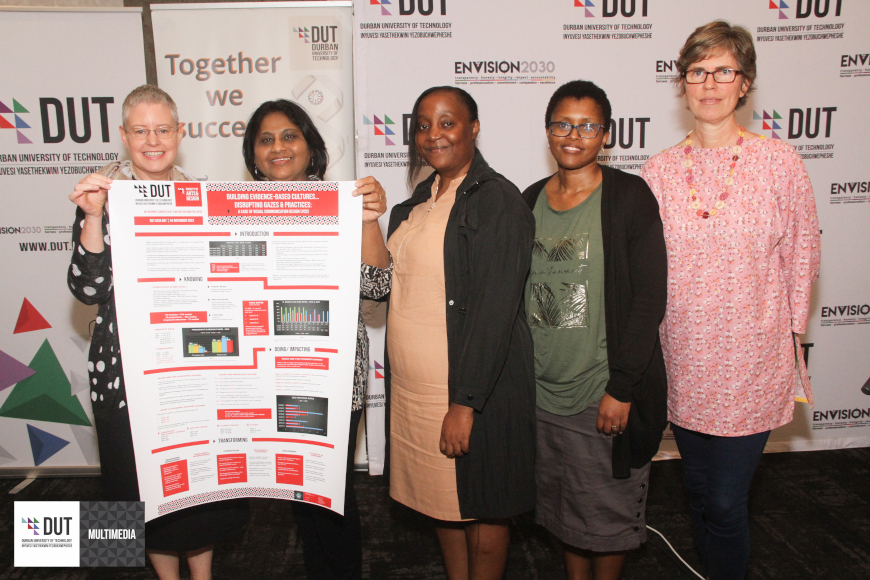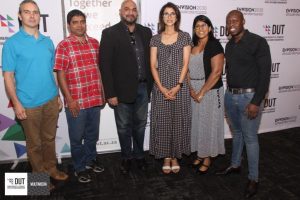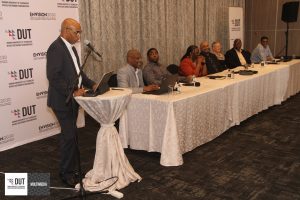The final day of the 2022 DUT Data Day was recently held as a hybrid event at Coastlands on the Ridge. The programme included two parts aligned to the Data Day theme, namely Knowing, Doing, Impacting and Transforming and commenced with a poster presentation by faculty Academic Development Practitioners (ADPs) and Quality Promotion Officers (QPOs). The second part of the programme was a panel discussion with the Executive Deans and representatives to share their thoughts on how the faculties are leveraging data to meet their goals for ENVISION2030. This session was facilitated by International Education & Partnership’s (IEP) Director, Dr Lavern Samuels.
The brief for the posters was to showcase evidence-informed faculty efforts to improve student success and the student lived experience aligned to ENVISION2030. The audience both online and at the venue were invited to vote for the Best Poster in two categories, Most Creative and Most Informative. The Faculty of Arts & Design scooped the prize in both categories with their poster titled Building Evidence based cultures in the faculty – Disrupting Gazes & Practices. As Ms Roshnee Sunder, Faculty ADP explains, the faculty’s academic support team works with available data, disaggregating and contextualising where possible, to identify poor performing programmes, modules, lecturers and students, and engages with the relevant programmes to explore further and strategize interventions to enhance student success. Through these deliberate and collaborative activities, the faculty nurtures and builds evidence-based cultures and data driven practices that inform and transform/disrupt the status quo. For the purpose of DUT Data Day 2022, how these practices unfold in the faculty is showcased through one of the programmes whose performance has been showing ‘slippage’ over the last few years. Evidenced based practices provide opportunities for turning the ‘not-so-good’ stories into great ones. To quote Vincent Tinto (2008), “access without support is not opportunity”. The critical question is how are we providing access with holistic support – both epistemic and ontological – to our students in their journeys of becoming? Some of the many interventions that the team are considering include:
- ‘Subject’ coordination will replace level coordination to improve scaffolding across modules.
- More regular staff meetings and team building activities to dismantle silos & build collegiality.
- Revisit the marketing, recruitment & retention strategies & operations.
- Revisit the curriculum to address bottlenecks and realistic expectations, including embedding the DUT Strategic Initiatives.
- Re-evaluate the role of the tutor.
Regarding the use of data to inform our practices, the FAD team’s advice is that data needs interrogation, ‘cleaning’ and contextualising, as data may not always reveal what is actually happening.
The second session entailed each Faculty Executive Dean talking about data and how it applies on a faulty level under the theme of: Knowing, Doing, Impacting & Transforming – How your faculty’s Teaching and Learning, Research, Community outreach and other work contribute to attaining ENVISION2030.
Executive Deans present at the panel discussion included: Prof Fulufhelo Netswera, Executive Dean: Faculty of Management Sciences, Prof Fulufhelo James Nemavhola: Executive Dean, Faculty of Engineering and the Built Environment, Prof Gugu Mchunu, Executive Dean: Faculty of Health Sciences, Prof Runette Kruger, Executive Dean Faculty of Arts & Design, Prof Tukayi Kudanga, Acting Executive Dean: Faculty of Applied Sciences, Head of Department: Dr Nalen Naicker from the Faculty of Accounting & Informatics. He represented the Executive Dean: Faculty of Accounting & Informatics, Prof Oludayo, O. Olugbara.
One of the crucial questions posed by Dr Samuels was on whether the use of data per faculty has changed over the last three years, and if so, why and how has it changed? The panellists reflected with Prof Netswera mentioning that everything his faculty does is based on data and data management. He further spoke on interesting data projects that his faculty are putting together for example the ongoing case analysis of the Master’s and Doctorates that have been produced since 2011 which they are analysing.
Prof Nemavhola added that his faculty is analysing data and challenges that they have, for example they are looking at the lecturer’s modules and pass rate and looking at coming up with some solutions.
Prof Mchunu explained that her faculty has a lot of data in terms of student data from student research every year.
“So if you look at our research productivity, we are on the lower end, so now the plan is to take whatever data that we have and turn it around and publish, publish, publish,” she said.
Prof Kruger mentioned that it was slightly more difficult for her to answer the data question in terms of a three-year overview of the use of data since she has not led the faculty until recently. However, she did give an indication of the impact of data that was the compiled for 2021, saying that the work done in the institutional planning is highly sophisticated and nuance.
Prof Kudanga spoke on the vital use of AutoScholar which has enabled his faculty to be more productive and to act immediately.
“Instead of working on maybe at-risk students, we actually want to prevent that risk student,” he stressed.
Dr Nalen Naicker expressed that his faculty is in a really strong position as they use the data to try to control and compare to the previous year, how they can get better, what has changed and to make use of various tools.
Delivering the vote of thanks was Prof Suren Singh, Acting DVC Teaching & Learning. He gave thanks to the Data Day organisers, all attendees and presenters for their insightful talks, especially the keynote address delivered by Mr Udeshkumar Ramsundar, Director – Financial Operations & Accounting on: The Role of Financial Sustainability in ENVISION2030.
He also enjoyed the insightful presentation by Prof Motaung on start-ups, IPs and MOUs, he also made mention of the outstanding poster presentations and congratulated the winning faculty.
“Everybody has a different DNA, but we all need to be collective in our approach. Thank you, everybody for a wonderful three-day Data Day workshop and I’m very hopeful that you can achieve even better when we meet here again next year,” concluded Prof Singh.
Pictured: Prof Runette Kruger, Executive Dean Faculty of Arts & Design and the team that developed the winning poster.
Dr Koo Parker/Waheeda Peters




